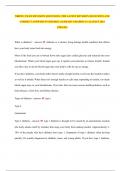NBHWC EXAM REVISION QUESTIONS. THE LATEST REVISION QUESTIONS AND
CORRECT ANSWERS IN 2024/2025. (ALREADY GRADED A+) (LATEST 2024
UPDATE)
What is diabetes? - answer- diabetes is a chronic (long-lasting) health condition that affects
how your body turns food into energy.
Most of the food you eat is broken down into sugar (also called glucose) and released into your
bloodstream. When your blood sugar goes up, it signals your pancreas to release insulin. Insulin
acts like a key to let the blood sugar into your body's cells for use as energy.
If you have diabetes, your body either doesn't make enough insulin or can't use the insulin it makes
as well as it should. When there isn't enough insulin or cells stop responding to insulin, too much
blood sugar stays in your bloodstream. Over time, that can cause serious health problems, such as
heart disease, vision loss, and kidney disease.
Types of diabetes - answer- type i
Type 2
Gestational
Type 1 diabetes - answer- type 1 diabetes is thought to be caused by an autoimmune reaction
(the body attacks itself by mistake) that stops your body from making insulin. Approximately 5-
10% of the people who have diabetes have type 1. Symptoms of type 1 diabetes often develop
quickly. It's usually diagnosed in children, teens, and young adults. If you have type 1 diabetes,
,you'll need to take insulin every day to survive. Currently, no one knows how to prevent type 1
diabetes
Type 2 diabetes - answer- with type 2 diabetes, your body doesn't use insulin well and can't
keep blood sugar at normal levels. About 90-95% of people with diabetes have type 2. It develops
over many years and is usually diagnosed in adults (but more and more in children, teens, and
young adults). You may not notice any symptoms, so it's important to get your blood sugar tested
if you're at risk. Type 2 diabetes can be prevented or delayed with healthy lifestyle changes, such
as losing weight, eating healthy food, and being active
Gestational diabetes - answer- gestational diabetes develops in pregnant women who have
never had diabetes. If you have gestational diabetes, your baby could be at higher risk for health
problems. Gestational diabetes usually goes away after your baby is born but increases your risk
for type 2 diabetes later in life. Your baby is more likely to have obesity as a child or teen, and
more likely to develop type 2 diabetes later in life too
Prediabetes - answer- in the united states, 88 million adults—more than 1 in 3—have
prediabetes. What's more, more than 84% of them don't know they have it. With prediabetes, blood
sugar levels are higher than normal, but not high enough yet to be diagnosed as type 2 diabetes.
Prediabetes raises your risk for type 2 diabetes, heart disease, and stroke.
Type 1 diabetes risk - answer- type 1 diabetes is thought to be caused by an immune reaction
(the body attacks itself by mistake). Risk factors for type 1 diabetes are not as clear as for
prediabetes and type 2 diabetes. Known risk factors include:
Family history: having a parent, brother, or sister with type 1 diabetes.
,Age: you can get type 1 diabetes at any age, but it's more likely to develop when you're a child,
teen, or young adult.
In the united states, whites are more likely to develop type 1 diabetes than african americans and
hispanic/latino americans
Type 2 diabetes risk - answer- have prediabetes
Are overweight
Are 45 years or older
Have a parent, brother, or sister with type 2 diabetes
Are physically active less than 3 times a week
Have ever had gestational diabetes (diabetes during pregnancy) or given birth to a baby who
weighed more than 9 pounds
Are african american, hispanic/latino american, american indian, or alaska native (some pacific
islanders and asian americans are also at higher risk)
If you have non-alcoholic fatty liver disease you may also be at risk for type 2 diabetes.
Not being physically active
*same risks for prediabetes
Gestational diabetes risk - answer- had gestational diabetes during a previous pregnancy
Have given birth to a baby who weighed more than 9 pounds
Are overweight
, Are more than 25 years old
Have a family history of type 2 diabetes
Have a hormone disorder called polycystic ovary syndrome (pcos)
Are african american, hispanic/latino american, american indian, alaska native, native hawaiian,
or pacific islander
Blood pressure - answer- the pressure that is exerted by the blood against the walls of blood
vessels
Systolic blood pressure - answer- the pressure created when the heart contracts and forces blood
out into the arteries
Diastolic pressure - answer- blood pressure that remains between heart contractions.
The seventh report of the joint national committee on prevention, detection, evaluation, and
treatment of high blood pressure (2003 guideline) - answer- normal systolic: less than 120 mm
hg
Diastolic: less than 80 mm hg
At risk (prehypertension) systolic: 120-139 mm hg
Diastolic: 80-89 mm hg
High blood pressure (hypertension) systolic: 140 mm hg or higher
Diastolic: 90 mm hg or higher




